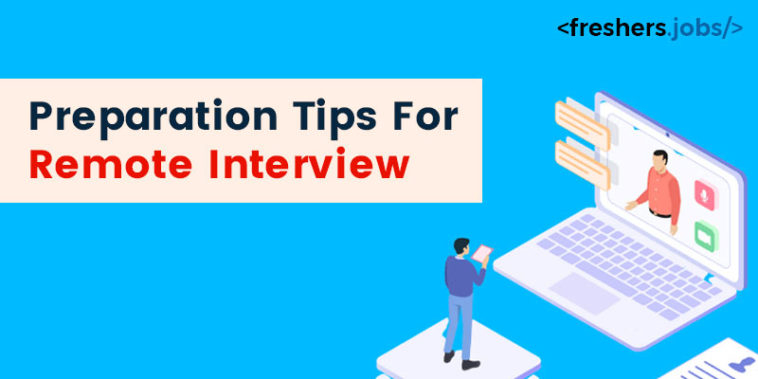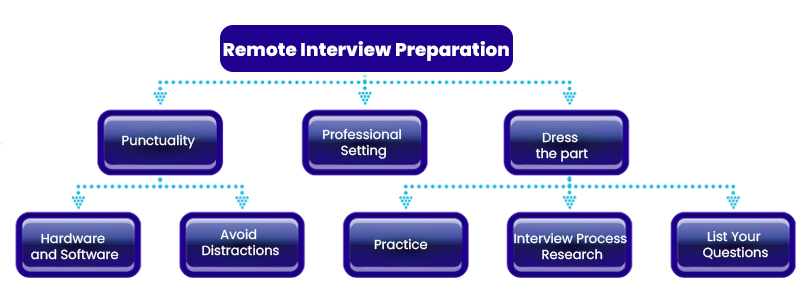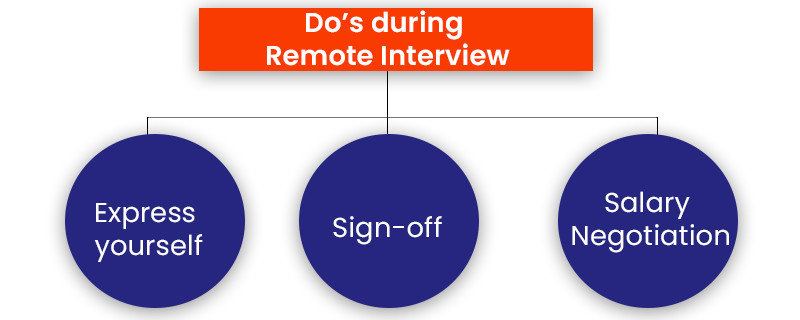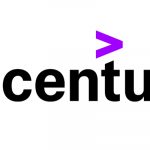In light of the increasing prevalence of remote work across various sectors, employers gradually opt for remote or virtual interviews as part of their hiring process. With these interactions occurring through online platforms, evaluators may face difficulties in gauging non-verbal cues and visual presentation, which can impact effective communication.
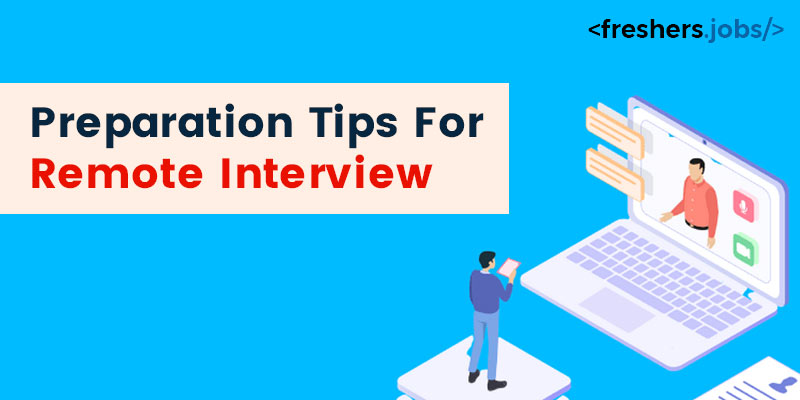
To handle those situations, acquiring the skills needed to prepare for your Remote interview is advantageous. This blog explores the concept of Remote office interview, and offers a systematic approach to help you get prepared. As a freshers jobs seeker, it will help you to impart valuable tips to enhance your prospects of a successful outcome. Let’s initiate it by learning what is a Remote Interview.
What is a Remote Interview?
A Remote Interview, also known as a Virtual Interview, is a job interview conducted through online communication tools or platforms rather than in person. It typically involves video conferencing software, telephone calls, or other digital means to connect job candidates with interviewers or hiring managers. Remote Interviews have become increasingly common, especially with the growth of remote work and the convenience of technology. During a remote interview, candidates are evaluated based on their qualifications, responses to interview questions, and overall fit for the job, all while interacting with interviewers via digital communication methods. Let’s see the tips for how to prepare for interview for freshers.
Are you in search of job openings in Hyderabad? Then, you can look for job openings available in that city. Visit fresher job openings in Hyderabad to find job positions that are relevant to your skills and abilities.
How to prepare for a Remote Interview?
Let’s see how to prepare before attending a Remote Interview.
- Punctuality: Punctuality is essential, just as it is in face-to-face interviews. It’s necessary to be prepared and logged in 15 to 20 minutes earlier than the scheduled interview time. Take the time to confirm that all your hardware and software tools are in proper working order. Additionally, consider organizing easy access to essential documents like your resume and supplementary information sources such as the company’s website. This will aid you in providing prompt and pertinent responses to questions during the Remote office interview.
- Professional Setting: Selecting an appropriate professional environment is very important for virtual interviews, and it is advisable to uphold the same level of professionalism as you would in an in-person interview. Verify that your background appears neat, well-organized, and has adequate light. This conveys to the interviewers that you prioritize professionalism in your workspace, potentially leaving a favorable impression regarding your work ethic.
- Dress the part: Given the formality of the virtual interview, it’s crucial to dress professionally to leave a strong impression. Essential elements for virtual interviews include maintaining positive body language, a proper posture, and an appropriate tone. Speak in a business-like manner and make a point of looking directly into the camera to uphold the same level of eye contact as you would in an in-person interview.
- Hardware and Software: Having a good grasp of technology is essential for roles that involve remote work. A Remote office interview necessitates the use of a functional computer camera and microphone, as well as a platform for conducting the interview. It’s important to confirm that you have the necessary software installed for the interview and that your hardware is in proper working order. On the day of the interview, assess the camera angle and select one that provides optimal lighting for your face. Additionally, make sure that your internet connection speed can smoothly stream videos without buffering or lag, and ensure you have the required antivirus and security software to safeguard your digital privacy.
- Avoid Distractions: Virtual interviews are frequently conducted from a candidate’s home, emphasizing the need to reduce distractions and enable the interviewers to concentrate on you. It’s advisable to place your laptop on a stable surface like a table to avoid unwanted movements and instability. Additionally, it’s considerate to inform those in your family or neighbors about your interview and kindly request that they maintain a quiet environment to minimize distractions. If you have pets that could potentially disrupt the interview, it’s a good idea to keep them in a separate room during the interview. An uninterrupted conversation underscores your regard for the professional nature of the process and the interviewing team.
- Practice: Responding promptly and authentically in interviews is advantageous, and prepping in advance can assist in achieving this goal. It’s essential to approach virtual interviews with the same level of preparation as you would for a regular office interview to prevent your responses from looking like rehearsed answers. This approach can boost your confidence and enable you to provide answers rooted in your research and expertise. Moreover, acquiring proficiency in basic software operations, like messaging or screen sharing during the interview, can demonstrate your competence in remote work effectively.
- Researching the Interviewing Process: Conducting research on the interview process and identifying common questions related to the role you are pursuing can be beneficial. This approach allows you to anticipate the interview’s content and prepare your responses accordingly, enhancing your confidence during the conversation. Furthermore, taking the time to research the company showcases your keen interest in the position and your commitment to securing the job.
- List the questions you want to ask: Just like in a regular office interview, a virtual interview offers you, as a candidate, the chance to gain a better understanding of the company and the position you’re seeking. It’s worthwhile to express your expectations and seek clarification on the role’s requirements. It’s common during these interviews to inquire about the company’s culture and job opportunity benefits. By evaluating the responses to these inquiries, you can more effectively determine whether the opportunity aligns with your needs and preferences.
ITC offers a wide range of job vacancies for freshers. Interested Candidates can click on ITC Jobs For Freshers to apply for various job roles relevant to their skills and abilities.
Do’s during Remote Interview
- Express yourself: An interview allows you to showcase your professionalism, individuality, and ability to function as part of a team. Share about your skills and abilities that illustrate your approach to handling tasks and collaborating with colleagues to facilitate a seamless workflow. This can underscore your commitment to your work and set you apart from other candidates.
- Sign-off: When it comes to an office interview, it comes with a fixed duration specified by hiring managers in their invitations. When it comes to virtual interviews, the way you wrap up is significant. As you near the conclusion, after addressing the relevant questions, express your enthusiasm for the position and seek confirmation regarding the expected response timeline. This gesture can demonstrate your professionalism and enhance your standing as a candidate.
- Salary Negotiation: As you progress successfully through different interview stages, hiring managers may inquire about your salary expectations to assess your fit within the organization. It’s advisable to be prepared in advance by researching industry standards for the position and taking into account your educational background and skills during the Salary Negotiation part. Effectively negotiating with the interviewers will help them to recognize the value you can bring to the company if you were to join their team.
Some Remote Interview Questions
Some interview questions are frequently asked during a Remote Interview.
Your potential employer might inquire about your reasons for seeking remote employment. It’s important to be transparent about your motivations and frame them in a way that showcases how remote work can be advantageous for both you and the employer. There are various factors that drive my desire to work remotely.
- What motivates your interest in remote work?
First and foremost, I have found that I am often more productive when working in a remote environment. The reduced distractions and the ability to create a personalized workspace enable me to focus more effectively on tasks, leading to increased efficiency and quality of work.
Another reason for my interest in remote work is the geographical flexibility it offers. I am living in a rural area with limited job opportunities in my field, and remote work allows me to access a broader range of job prospects without the constraints of a lengthy commute or relocation. This not only benefits me personally but also opens up the possibility for employers to tap into talent from diverse locations.
Moreover, while the idea of remote work is appealing, my enthusiasm is further fueled by the prospect of working for your company specifically. Your company’s values, mission, and the exciting opportunities it presents align perfectly with my career goals and aspirations. I believe that remote work at your organization would not only be personally fulfilling but also contribute to the success and growth of the company.
In your Remote office interview, employers may ask you the reason for choosing the particular company and job role.
- What attracts you to our company and this specific role?
I’m genuinely excited about the opportunity to join your company and take on this role, and my interest is deeply rooted in the unique qualities and values that your organization embodies.
Your company’s commitment to innovation and its consistent track record of pushing boundaries in the industry truly resonates with me. I have followed your recent product launches and advancements closely, and I’m inspired by how you are shaping the future. This aligns perfectly with my career aspirations to be part of a forward-thinking team, contributing to meaningful projects that make a difference.
In a Remote office interview, they also ask you about your schedule planning, prioritization of tasks and motivation.
- How do you manage your schedule, prioritize tasks, and maintain motivation while working independently?
Managing my schedule, prioritizing tasks, and staying motivated are vital aspects of my work approach, particularly in a remote work environment where self-discipline and focus are essential. To begin with, I’m a firm believer in the power of organization. I rely on a combination of digital tools and old-fashioned methods to keep me on track. Each day, I create a to-do list outlining the tasks I need to complete.
Prioritization is another key element of my workflow. When faced with multiple tasks, I assess their urgency and importance. I categorize tasks into four quadrants: urgent and important, important but not urgent, urgent but not important, and neither urgent nor important. This approach allows me to efficiently prioritize tasks and tackle the most important ones first, ensuring that I meet deadlines and achieve goals effectively.
Maintaining motivation is important when working independently. I’ve found that setting clear goals and breaking them down into smaller, achievable milestones keeps me motivated. Celebrating these milestones, even the small ones, provides a sense of accomplishment and drives me to stay on track.
In conclusion, the preference for remote work nowadays. As the advancement of technology increases, it becomes more convenient for employers to conduct interviews through online mode in various parts of the world and find new talents. So, in this blog, we delved into what is a Remote office interview and how to prepare for the interview questions.

